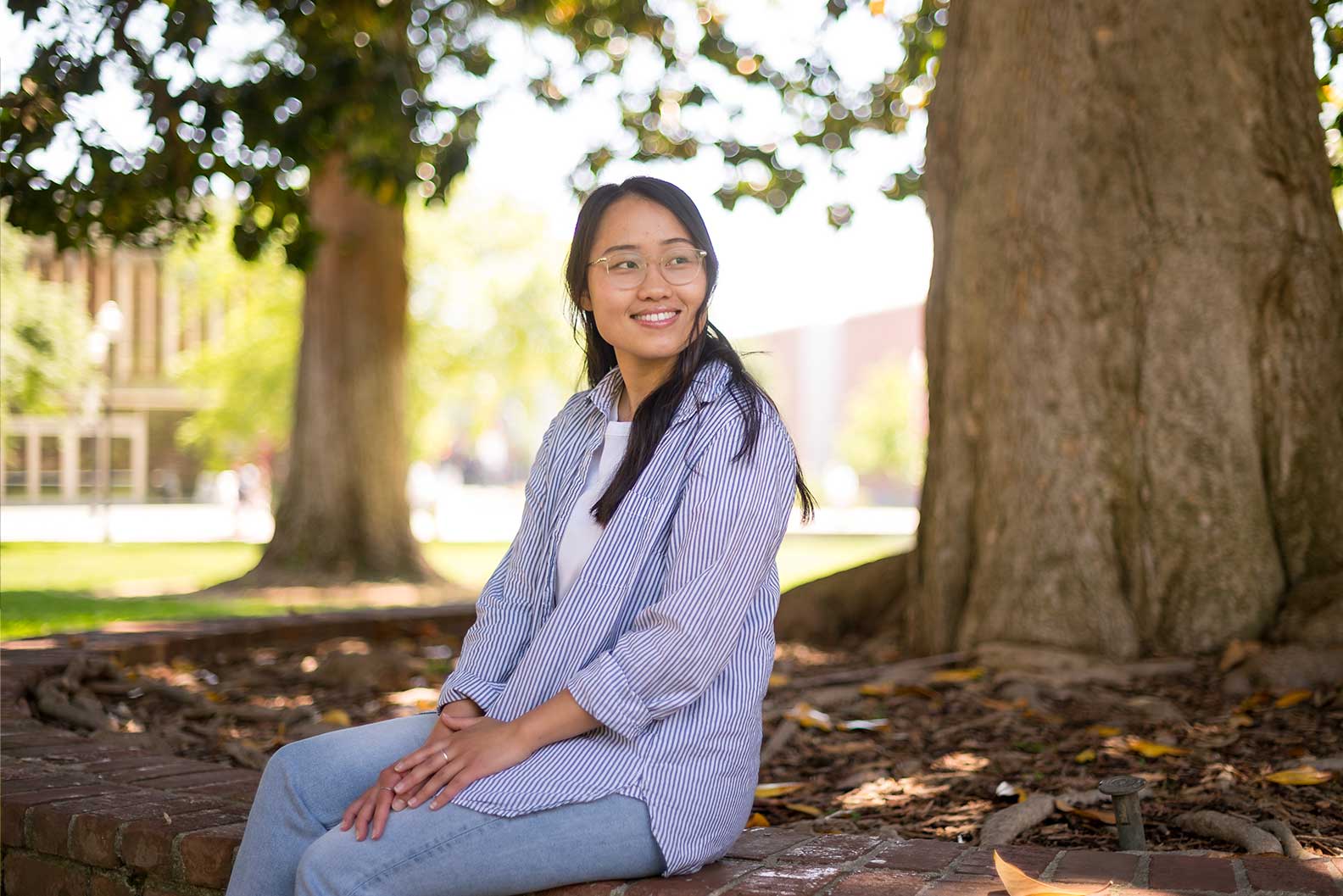Connecting Generations Through Understanding

Pa Yang sees learning as a continual process with no defined beginning or end.
At the same time, the Oroville native channels everything she learns from life and college into making her community stronger, more connected, and (hopefully) happier.
On the cusp of receiving her master’s in psychology, Yang’s (Psychology, ’21) thesis focused on acculturation and well-being in the Hmong community. Specifically, her work deals with the inter-generational and familial conflicts that often arise when one’s heritage culture undergoes shifts as its people assimilate into a new country or environment.
“I really started off thinking about my personal life experiences and my local Hmong community members, as well as those that I’ve grown up with,” she said, speaking to the origins of her project. “Based on research out there, it was apparent that I wasn’t the only one that was experiencing this—it’s kind of a communal experience. A lot of the issues that were most prominent boiled down to intergenerational conflict.”
An example of this intergenerational conflict is the language barrier that often exists between family and community members. “Some of the older Hmong generations only know Hmong, while some of the younger generations only know English. Therefore, the felt distance between the generations may be widening,” Yang explained. “Some members of the younger generation may feel shame for not being able to communicate in Hmong and some folks of the older generation may feel like the younger generations don’t care about them because of the younger generation’s lack of communication in the Hmong language.”
From this single question around language, one can zoom outward and find adjacent, interconnected conflicts. The web of questions this created has been her focus for two years now. “When I finished my thesis, in some ways I felt like I was in a state of confusion. There was still much more to learn and more questions that needed to be asked.”
Martin Van den Berg, associate professor and chair in the psychology department, and Yang’s advisor since her time in the honors program, said that it has been his privilege to continue working with Yang on her master’s thesis project once she entered the graduate program.
“It has been an absolute joy working with Pa,” he said. “Throughout, she has consistently been an engaged scholar, aiming to conduct research that could be of benefit to communities she cares about. I have been very impressed with her thesis project, in which she did not only examine an intergenerational acculturation generation gap in the Hmong community, but also actively included voices of Hmong community members in the project.”
It’s no surprise that Yang looked inward for inspiration. Serving her community is a core value that she expresses daily in ways that range from playing music at her church to volunteering and connecting with people across generational lines.
Her family is a poignant example of the shifts in experiences that multiple generations can experience when families immigrate. In fact, her thesis is a tribute to her late father, Xue, who came to the US in the late ’80s with her mother and then-five siblings. “My dad instilled the importance of education in all of us at a very young age,” Yang said. “He made a big mark in my life and this accomplishment of graduating is in part to honor him, my mom, and my family.”
Outside of research, Yang worked for the writing center on campus since her junior year, which provides no-cost tutoring and feedback to students. She started as a writing tutor and was promoted to lead writing mentor when she began graduate studies, which allows her to train and mentor tutors who are working with students.
“This work has impacted me so much,” Yang said. “Working with students at first, I really got to develop and hone my listening and processing skills through helping students one on one. Working with tutors now has taught me to be collaborative and open, but still doing so in a professional manner.” Her biggest takeaway, she said, is that “if you don’t listen, you’re not going be able to understand the people you’re serving. And if you don’t understand them, you might not be able to help them as best as you can.”
This clear, genuine insight is exactly the type of clarity that Yang brought to her thesis.
In her research, she found that younger generations within Hmong communities (mainly 18–25 years in age) are highly acculturated in contemporary America. The more acculturated the Hmong participants were, the better their well-being.
To help bridge the gap and mitigate intergenerational conflicts, Yang posits that members who know both languages can be mediators—but should be careful in their interpretation and communication to avoid misunderstandings. Community organizations, clubs, and professionals like teachers can assist by incorporating and providing safe spaces for discussion and healthy environments to process.
“Simply, the most practical suggestion is to be open to listening and to learn with and from each other,” she said. “It might not solve all problems but it can help build a common ground which is simply that both sides want to be connected.”
For Yang, the end of this leg of her academic journey signals the beginning of a different, equally important chapter in her own story: one of rest and recuperation. When Pa Yang receives her master’s degree in May, she will take her first break from education since beginning elementary.
“I think it’s about time for me to take a break,” she said. “I have loved my educational journey and I think it’s also healthy for me to take a step out and get experience through the workforce.”
While Yang wants to stay in the field of psychology and pursue opportunities to continue teaching and building on her work, she is also excited to do more of what she loves most—serving her community and church through music. At the same time, living as a bridge that connects generations.


